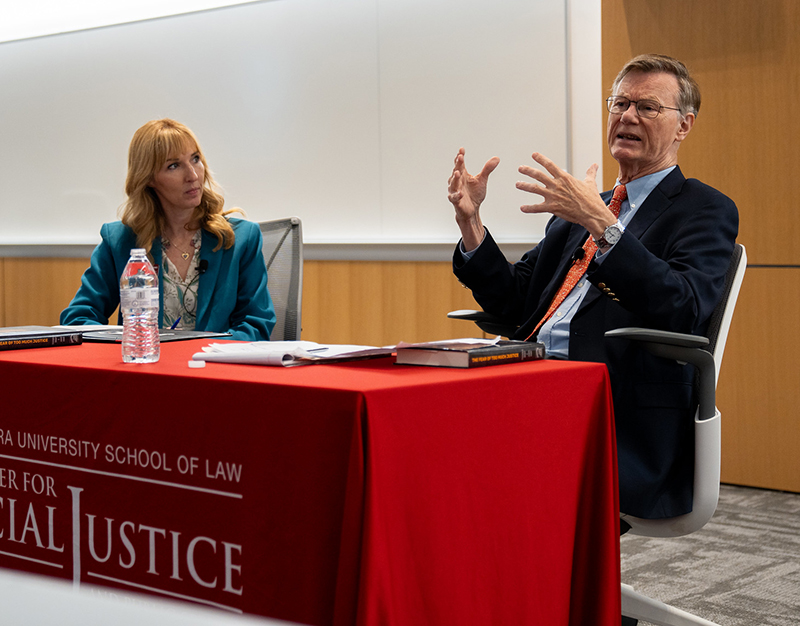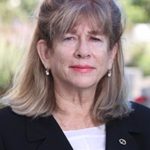 On November 8, Charney Hall welcomed acclaimed author Stephen B. Bright for a conversation on his latest book, The Fear of Too Much Justice: Race, Poverty, and the Persistence of Inequality in the Criminal Courts. The event, led by the Center for Social Justice and Public Service, was co-sponsored by External Relations and Development and the Office of the Dean. The talk was open to the public.
On November 8, Charney Hall welcomed acclaimed author Stephen B. Bright for a conversation on his latest book, The Fear of Too Much Justice: Race, Poverty, and the Persistence of Inequality in the Criminal Courts. The event, led by the Center for Social Justice and Public Service, was co-sponsored by External Relations and Development and the Office of the Dean. The talk was open to the public.
Bright, a visiting professor of law at both Georgetown and Yale Law School and thirty-five-year director of the Southern Center for Human Rights in Georgia, has years of experience defending clients in criminal cases with an emphasis on representing individuals in death penalty cases. He has represented many people sentenced to the death penalty, even having argued four cases before the Supreme Court, all of which were successful. He has been awarded the American Bar Association’s Thurgood Marshall Award, among other commendations. On this occasion, he flew out to California to share his thoughts on injustice and inequality in the criminal justice system with our students at Charney Hall.
Among lunch and light refreshments, Professor Evangeline Abriel, Faculty Director for the Center for Social Justice, offered words of welcome to the assembled guests before introducing Bright and Professor Caitlin Jachimowicz, Director of the Center for Social Justice, who moderated the event. During the book talk, Professor Jachimowicz offered questions and facilitated discussion between the guests and Bright.
The conversation began with a discussion on the problem of equal access to representation and the injustice of incarceration for the under-represented. “Nothing matters more in our legal justice system today than how much money you have,” Bright notes. “If you’re a person with money, you’ll probably have a lawyer down there within hours and you’ll be home for dinner tonight. If you’re a poor person, you might languish in jail for weeks, even months, before you see a lawyer for the first time to try and get you out of jail. You’ve lost your job, you’ve probably lost your home in all that time.”
Later, the discussion shifted to the politics of justice. Bright commented on the nature of elected judges in state courts as political figures: “If you rule a certain way on a large-scale case, that’s signing your own political death warrant. When people are running for judge, you would think these people were running for sheriff; they’re talking about cracking down on crime and the death penalty—these are people running for judge!”
Bright also offered commentary on the subject of “meet ‘em and plead ‘em” justice, which is where defendants are often pressured into plea deals in the name of expedited casework. “We see this ‘meet ‘em and plead ‘em’ everywhere,” he says. “You meet your lawyer for five minutes, no assessment of the prosecution’s case, no assessment of the legal facts. It’s not law. It’s not representation, it’s that someone wants to check off on a list that this person had a lawyer. Nothing means anything without a lawyer. You got to have competent counsel for the accused.”
On the future of justice in America and the role that future practitioners of law could have, he remarked, “It’s gonna depend. What’s important is who’s on the ground in the communities, representing people, counseling people, listening to people, and helping them with their cases. One of the great things about being a lawyer is responding to people with desperate needs and going to them. It’s not about winning their case—maybe you won’t—just to have a lawyer sit down with you and listen to you and counsel you, those kinds of things are so important.”
Following the talk, Bright chatted with students and signed copies of his book. On behalf of the students, faculty, staff, and guests who attended, we are thankful for his time and his wisdom!

